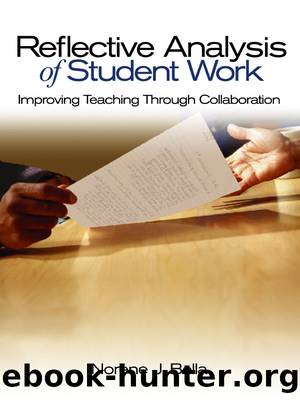Reflective Analysis of Student Work by Bella Norene J.;

Author:Bella, Norene J.; [Bella, Norene J.]
Language: eng
Format: epub
ISBN: 1994865
Publisher: Corwin Press
Published: 2004-08-15T00:00:00+00:00
⢠Imagine a classroom discussion in which students are able to actively listen to each other. They are able to summarize the speakerâs words. Through active listening they are able to reach a consensus as a group.
⢠Picture students working on a new computer program. They realize they are limited in their ability to proceed smoothly and accept setbacks as a normal part of learning. Their display of insight into the situation is an example of intellectual engagement.
⢠Students whose approach to a new task is to take their time in the planning stage to thoroughly think through the various steps they intend to undertake are demonstrating a high degree of metacognition. They realize they need to think before taking action.
⢠When students are faced with logic puzzles or deductive reasoning scenarios, the answer is rarely obvious. When one attempt to solve the puzzle is not successful, an alternative strategy is tried. This is a display of persistence, an indicator of intellectual engagement.
⢠When conducting experiments in science, students pose solutions to problems in order to see if their hypothesis is realistic. If the results are not as expected, students probe the causes of the problem and investigate new ideas as a way of being engaged intellectually.
⢠Students who can cite examples from their own experiences that connect to characters in a story are involved intellectually. They understand the relevance of the reading to their lives.
⢠When students are able to understand the subtleties of irony, they have acquired the intellectual trait of scholarly humor.
Many of these examples are displayed daily in classrooms everywhere. But how can educators make these situations more predictable? Teachers need to share their work with other professionals to learn from one another and to identify and reinforce these situations. Participating in Guided Collaborative Discussion of Student Work can accomplish this.
Download
This site does not store any files on its server. We only index and link to content provided by other sites. Please contact the content providers to delete copyright contents if any and email us, we'll remove relevant links or contents immediately.
The Art of Coaching Workbook by Elena Aguilar(51201)
Trainspotting by Irvine Welsh(21668)
Twilight of the Idols With the Antichrist and Ecce Homo by Friedrich Nietzsche(18635)
Fangirl by Rainbow Rowell(9254)
Periodization Training for Sports by Tudor Bompa(8274)
Change Your Questions, Change Your Life by Marilee Adams(7783)
This Is How You Lose Her by Junot Diaz(6889)
Asking the Right Questions: A Guide to Critical Thinking by M. Neil Browne & Stuart M. Keeley(5775)
Grit by Angela Duckworth(5615)
Red Sparrow by Jason Matthews(5476)
Paper Towns by Green John(5191)
Room 212 by Kate Stewart(5125)
Ken Follett - World without end by Ken Follett(4734)
Housekeeping by Marilynne Robinson(4449)
The Sports Rules Book by Human Kinetics(4388)
Papillon (English) by Henri Charrière(4274)
Double Down (Diary of a Wimpy Kid Book 11) by Jeff Kinney(4273)
The Motorcycle Diaries by Ernesto Che Guevara(4102)
Exercise Technique Manual for Resistance Training by National Strength & Conditioning Association(4072)
